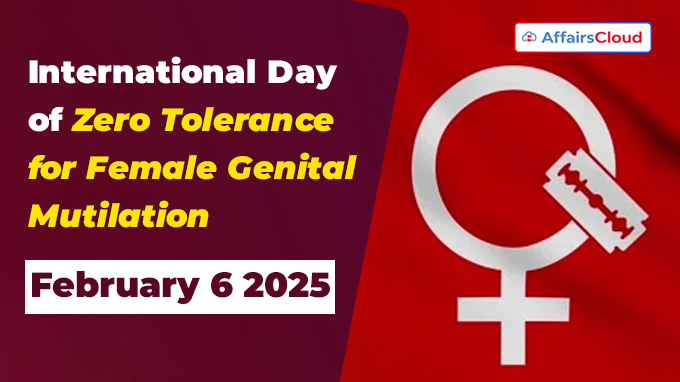 The United Nations (UN’s) International Day of Zero Tolerance for Female Genital Mutilation (FGM) is observed annually on February 6 across the globe to raise awareness and amplify global efforts to eliminate the harmful practice of FGM. This day serves as a platform for stakeholders to celebrate progress, advocate for the abandonment of FGM, and continue efforts to protect girls and women from this violation of their rights.
The United Nations (UN’s) International Day of Zero Tolerance for Female Genital Mutilation (FGM) is observed annually on February 6 across the globe to raise awareness and amplify global efforts to eliminate the harmful practice of FGM. This day serves as a platform for stakeholders to celebrate progress, advocate for the abandonment of FGM, and continue efforts to protect girls and women from this violation of their rights.
- 6 February 2025 marks the 14th observance of UN recognised International Day of Zero Tolerance for FGM.
- The theme of International Day of Zero Tolerance for FGM 2025 is: “Stepping Up the Pace: Strengthening Alliances and Building Movements to End Female Genital Mutilation”.
Background:
i.On February 6, 2003, Stella Obasanjo, the First Lady of Nigeria and a prominent advocate for the Campaign Against FGM, made the official declaration of “Zero Tolerance for FGM” in Africa at a conference organized by the Inter-African Committee on Traditional Practices Affecting the Health of Women and Children (IAC).
- The first International Day of Zero Tolerance for FGM was observed on February 6, 2003.
ii.Following this, February 6 was officially recognized by the UN Sub-Commission on Human Rights as the International Day of Zero Tolerance for FGM.
iii.On December 20, 2012, the UN General Assembly (UNGA) adopted resolution A/RES/67/146, declaring February 6th each year as the International Day of Zero Tolerance for Female Genital Mutilation.
Female Genital Mutilation (FGM):
i.FGM refers to the partial or total removal of the external female genitalia or other injury to the female genital organs for cultural or non-medical reason and is referred to as a harmful traditional practice.
ii.FGM is most commonly performed on girls between the ages of infancy and 15 years old, although it can also occur in adulthood.
iii.In many communities, it is performed in infancy, childhood, or before puberty and in some countries, it may be carried out on newborns or girls as young as 5-9 years old.
Global Impact of FGM:
i.Over 230 million girls and women worldwide have survived FGM, which causes severe physical, psychological, and social harm, with consequences that last a lifetime.
ii.Each year, about 4 million girls are at risk of undergoing FGM, and this number is projected to rise to 4.4 million in 2025.
iii.Africa bears the heaviest burden, with over 144 million cases of FGM, followed by Asia with 80 million and the Middle East with 6 million cases.
iv.Every year, 27 million girls are at risk of becoming victims, and if action isn’t taken, an additional 27 million girls may endure FGM by 2030.
v.At least 200 million girls and women have undergone some form of FGM, with 44 million girls under 14 being the most affected.
vi.Countries with the highest prevalence of FGM among girls aged 15 to 49 include Somalia (98%), Guinea (97%), and Djibouti (93%).
Global Joint Program on Eliminating FGM:
i.Since 2008, the United Nations Population Fund (UNFPA) and United Nations Children’s Fund (UNICEF) Joint Programme has spearheaded the largest global effort to eliminate FGM, focusing on 17 countries in Africa and the Middle East.
ii.Phase IV, launched in 2022, intensifies the push for FGM elimination by 2030 which targets strengthening local efforts and policy frameworks.
iii.In 2008, the World Health Assembly (WHA) passed resolution WHA61.16, calling for unified action across all sectors to address FGM.
iv.In partnership with the End FGM European Network and the United States of America (USA) End FGM/C Network, a global report was published in 2020, highlighting the ongoing threat of FGM in at least 92 countries.A new update to this report will be released on 25 February 2025.
About United Nations Population Fund (UNFPA):
It began operating in 1969 as the United Nations Fund Population Activities.
Executive Director (ED)– Dr. Natalia Kanem
Headquarters– New York, United States of America (USA)




